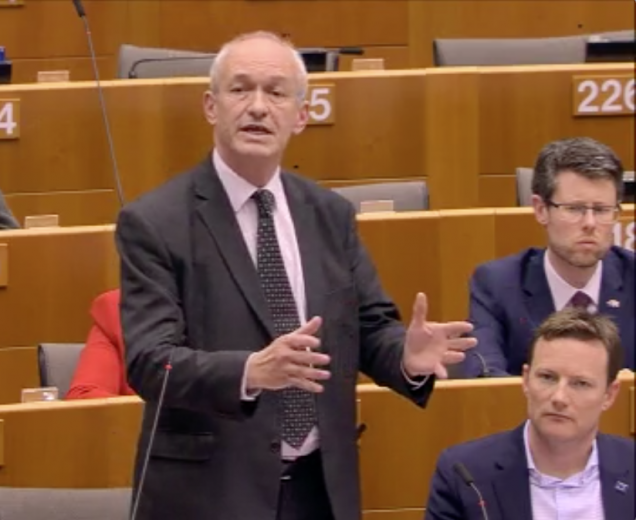New Europe-wide rules for VAT came into force this month, having been debated and agreed by EU countries back in 2008.
Among other things, the rules introduce a requirement for EU businesses selling digital services to charge VAT to online customers in other European countries at the rate that applies in the buyer’s country, rather than the seller’s. The intention of this change was to remove one advantage that multinational corporations have over small, local businesses — namely, their ability to move their base of operations to wherever the tax regime is most favourable so they can pay (and charge) less tax. This trick is not an option for small businesses, who are thus undercut by the big companies.
So the principle behind the rules change is a good one, and Labour strongly supported it (although I personally wasn’t an MEP when the new rules were agreed).
But towards the end of last year, I was alerted by constituents to some damaging side-effects — especially for small traders. After doing some initial research with colleagues, I wrote a blog post in December (republished in January after a website hack) outlining these concerns and passing on some clarifications about the new rules.
However, all is not well. Several constituents have been in touch with me since December to raise further concerns or to point out that the situation is more complicated than my first post suggested. Other Labour MEPs around the UK have had similar representations from their own constituents, not to mention strong lobbying from campaign groups representing sole traders and micro-businesses. According to some accounts, a number of small businesses have had to stop trading due to the new rules. This is clearly very bad news indeed — something has gone wrong.
Among the various areas of concern, three big worries have come up time and again in conversations with constituents:
- Many small businesses feel that these changes have been forced upon them at short notice, without enough thought about how they will be affected, and without any transitional help so that they can adapt. The changes apparently required to the e-commerce and administrative systems seem prohibitively complex, especially for businesses with small traders.
- Communication from the UK government about the rule changes has come very late, and been of very poor quality. Many small businesses have not had access to good advice about what services are covered, how they are supposed to apply the rules, how to collect the customer information that the rules seem to imply, and how to register for the one-stop shop set up by HMRC supposedly to simplify the process. A helpline has been set up by HMRC, but many people have complained that they are unable to get through.
- The lack of a threshold for charging VAT means that many businesses who previously did not charge VAT at all now have to implement systems to do so when selling to other EU countries (although the existing threshold still applies to UK sales). When Labour was in government, we requested a threshold, but this position has not been reflected in the current legislation.
I and other Labour MEPs have been raising these issue urgently over the past few weeks with the relevant authorities, both the UK government and the European Commission.
First, we have asked the government for emergency measures to aid small and micro-businesses attempting to navigate the new rules. Second, we have asked HMRC and the government urgently to improve the quality and quantity of information available in the UK, to eliminate confusion and make it clear exactly what businesses do and don’t have to do. And third, my colleague Neena Gill has asked the European Commission to review the legislation specifically to introduce a threshold to exempt businesses with small turnovers:
On 1 January 2015 the new EU VAT legislation came into force. It was designed to prevent Internet giants from avoiding tax, but will have a disproportionate effect on the smallest firms. The rule change will force small businesses, including those currently under the VAT turnover threshold, to register for VAT. This will increase the costs to SMEs as well as the administrative burden. Current estimates suggest that this will affect 264,000 early-stage businesses in the UK alone. The VAT MOSS (VAT Mini One-stop Shop) system is perceived as a disincentive to supplying consumers in other Member States and as going against the trend towards greater international trade, particularly over the Internet.
Is the Commission aware of these problems? How does this kind of legislation fit with the new Commission’s political priority of investing in the European economy with the digital economy as a centrepiece? Did the Commission analyse the potential impact of this legislation on SMEs? If so, what was its estimate of the negative impact of the measures on SMEs, and how would this be outweighed by potential positive effects?
If the Commission concludes that this legislation is disproportionate for a huge number of SMEs, will it propose a threshold under which small enterprises would be exempted from the VAT legislation?
Of course, any change to the rules on this cannot be simply imposed by the Commission, but have to be agreed by every member country.
As soon as we have anything to report on any of these fronts, I will share it here (and with those who have written to me directly).
In the meantime, I’ve also tried to find concrete answers to a number of factual questions from constituents and campaigners. These are below.
Questions and answers
What services are included under the new rules?
The changes apply to digital services. These are broadcasting, telecommunications and e-services that are electronically supplied.
An e-service includes:
- images or text, such as photos, screensavers, e-books and other digitised documents e.g. pdf files
- music, films and games, including games of chance and gambling games, and of programmes on demand
- online magazines
- website supply or web hosting services
- distance maintenance of programmes and equipment
- supplies of software and software updates
- advertising space on a website
The following are not included:
- supplies of goods, where the order and processing is done electronically
- supplies of physical books, newsletters, newspapers or journals
- services of lawyers and financial consultants who advise clients through email
- booking services or tickets to entertainment events, hotel accommodation or car hire
- educational or professional courses, where the content is delivered by a teacher over the internet or an electronic network (in other words, using a remote link)
- offline physical repair services of computer equipment
- advertising services in newspapers, on posters and on television
Who is responsible for sorting out the VAT liability if businesses sell through a third-party service such as Etsy or Folksy?
The third-party service is liable if it authorises the download or payment process, or if it sets terms and conditions.
What about Paypal?
Paypal provides a payment mechanism. It does not take part in the supply of services, so it is not responsible for accounting for VAT.
Is it true that there’s a glitch in the HMRC system that makes it impossible to register for EU VAT and not UK VAT?
HMRC are now saying that this is fixed (but the fact that it existed does seem to suggest that the UK government was not ready for the change).







6 Comments